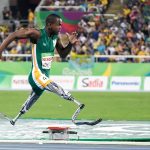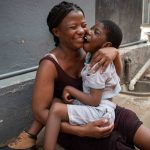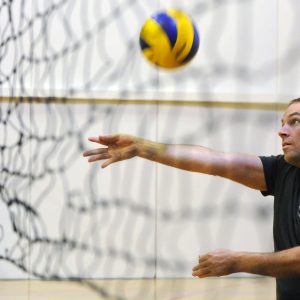Mpumelelo Mhlongo, star athlete and healthcare hero
The para-athlete who broke his own sprint record in Dubai last year is working to transform South Africa’s healthcare system while targeting a storming performance at the Tokyo Games next year.
Author:
5 June 2020

As a boy, Mpumelelo Mhlongo’s great-grandmother despised his impairment so much she called him “chicken foot” and would deny him porridge when no one was looking.
But while his family believed he was cursed, Mhlongo’s mother, the protagonist of his childhood as he calls her, stared down old myths to instil in her son a sense of self-worth and belonging. It was a simple act of defiance that would go on to shape Mhlongo’s life.
“While my family was discussing who had the black magic to cause this possessed demon to come out of her body, she decided to define my future through my name, Mpumelelo, meaning success,” he says in a steely voice as solid as the values that are the foundation of his life.
Far from being a source of pain and self-pity, Mhlongo’s club foot has been weaponised for a greater purpose.
One of those moments arrived when he pulled the trigger on an athletics career that would ultimately see him break his own world record in the combined 100m final of the 2019 World Para Athletics Championship in Dubai, as the only T44 athlete (single below knee amputee or those who have moderately reduced function in one or both legs) in a field of T64 sprinters (below knee limb deficiency). He added a silver medal in the long jump event for good measure.
Mhlongo has channelled years of learning and problem-solving to land himself at the coalface of a battle for space in an able-bodied world. It’s a fight he seems determined to win even as he pursues a doctorate in chemical engineering and takes on public speaking gigs and the not-so-insignificant task of transforming the healthcare system as an entrepreneur.
Related article:
“Me and a friend from high school, who also graduated from the University of Cape Town with me, founded a healthcare company start-up. After I lost two of my family members to bad public healthcare efficiencies, we sat down and tried to address the problem ourselves with the skill set that we had. It morphed into many things, but it ended with us saying there are three major issues that face healthcare: high prices, poor care coordination and an onslaught of chronic disease,” Mhlongo explains.
“We decided that digital health can address all these problems at once. We want to get involved in public healthcare to provide simple solutions that could save lives. In the digital age, we should never have people dying in hospital because they’re understaffed.”
Defying doctors’ projections
Mhlongo’s words find currency in the present Covid-19 climate, as South Africa faces the greatest healthcare storm it has ever seen. A historically derelict healthcare system, which struggles to serve the impoverished majority at the best of times, must now find planning and supply chain solutions faster than the coronavirus can spread. Mhlongo’s vision to improve inefficiencies and prevent death and trauma for millions can’t come soon enough.
For intellectual property reasons, Mhlongo is reluctant to share more details about his business idea. Nevertheless, a fair deal of his intellect is on display throughout his daily life. He is a 26-year-old who speaks about solutions in the same breath as he preaches advocacy for disabled people, and develops business models when he’s not solving chemical equations. He’s a unique voice for people who may need additional help and disabled people in a country that still treats 7.5% of its population as an inconvenience.
Mhlongo’s physical impairment is a superpower he has used to pry open doors beyond the Paralympic Games and world records. It has given him a voice to project across myriad societal issues, such as self-esteem and problem-solving.
Mhlongo had amniotic band syndrome while in the womb, a rare condition caused when strands of the amniotic sac separate and entangle the limbs of the foetus. His right leg is shorter than his left. Doctors told his mother he would live an immobile life. He went under a surgeon’s knife several times in the first three months of his life, and couldn’t walk or talk until he was about six years old.
Related article:
Yet despite the trauma of his birth and childhood, Mhlongo would be among the first to admit he has lived a privileged life in comparison with other disabled people. His story is devoid of the rags-to-riches plot enshrined in the hero’s journey. There are no riches, yet he is heroic.
“I’m from what people would term humble beginnings from a financial perspective. But from a social perspective, I had a huge amount of social wealth. There wasn’t the crime that exists today. You found your independence. You went out with the kids, played the whole day, and then you came back home to eat dinner. Nobody worried about you all the time, or about child trafficking.
“There was none of that crime because the community was so strong. I think that was the foundation of having this ‘I can do it’ attitude,” Mhlongo says. “At one stage, I couldn’t walk because I was in a cast. And the kids said, ‘Rubbish, if you can’t play with your feet, play with your hands. But you’re playing. You’ll be the goalkeeper.’ It is that inclusive social aspect that allowed me to push my own boundaries. I felt welcomed. I’m wanted. I can contribute something here.”
When Mhlongo’s father was posted to the Pinetown police station in Durban, his mother decided her son needed to go to the nearby school in the suburbs. She saved up two months’ school fees and told him, “Listen, you will go to a suburb school. We can’t afford it, but you’ll go and when you get there, you have to convince them that you have to stay.”
Dealing with bullying
And so, with his “gangster limp” as he calls it, Mhlongo set about finding a solution to the problem he faced. He got the scholarship, but it didn’t go the way he expected.
“I get into school and little kids are being ripped away from their parent’s arms, crying. I walked into class and a kid has just soiled his pants, yet my disability damned me to be the ‘freak of the year’,” he says with a puzzled expression.
Mhlongo is nonchalant about most things, but when he speaks about his life story, his words hang thick in the air between him and his audience. The opening line of his TedxUCT Talk goes, “I believe we are all a combination of the events that have happened in our lives.”
It is at this point that he tells the story of his great-grandmother and the bullying he endured as a child. He explains how he turned his torment into moments of teaching and learning, not only for himself but also for those around him.
“The lunchtime bullies decided they would spread the rumour that what I had was contagious. Like a sheep without a shepherd, all the kids scattered away. In those moments I had many thoughts, I had many words. There I was, teary-eyed, snotty-nosed, with my congenital gangster limp. I walked off to class where I found my teacher and explained to her what had happened and my course of action.
“She hugged me and told me she wants to address it. When the rest of the class came in, I stood up and said to them, ‘My name is Mpumelelo Mhlongo. I was born with a condition that led me to go in and out of hospital for many years. What I have is a gift from God and what I can promise you is this, whatever you say will not affect me because I grew up with ukhokho [great-grandmother] who used to call me ‘chicken foot’ and deny me porridge when no one was looking because she said I disgusted her.”
Related article:
If Mhlongo had not been prepared for those moments, or if he allowed it to swallow him, we may never have heard of Mpumelelo Mhlongo. He needed no more motivation than that and if he slipped up, there were other ways. “My mom just had a long whip. She always used to use her famous phrase, ‘Don’t disappoint my genes,’” he laughs.
He, like most para-athletes, sought no pity, only respect. His family now say he was blessed with more brain cells because of his condition, he laughs.
Today, Mhlongo’s Mpumi2020 campaign is a vehicle to advocate for and raise awareness on behalf of disabled people in Africa, and athletes in particular.
“The story is that there are 80 million people in Africa with physical and/or intellectual disabilities … They are the subclass in the continent we perceive to be the poorest on Earth. The unluckiest will become ‘the institutionalised’ and beaten, and most of those called lucky will be ‘the homebound’, the ‘cursed’, the forgotten. The story is that the disabled in Africa live in the shadows of society, with a life expectancy 25 years lower than the average global citizen,” he wrote in a Medium opinion piece.
Para-athlete sponsorship apathy
As a para-athlete, Mhlongo has first-hand experience of the inconsistent support on offer to elite disabled athletes. There is a double standard, if not hypocrisy in the manner in which funding is allocated. Goalposts never stand still, lip service is in abundance and athletes like Mhlongo survive on the little that trickles down, working full-time jobs that often hinder their progress as athletes.
“All the countries that invested in developing para-sports reaped the rewards in Dubai last year. Brazil came out of nowhere, from not being ranked in the top 20 a few years ago to finishing in the top five. China continues to be a dominant force, and then Great Britain. When you look at the support structure that exists for those para-athletes compared to us, it’s a joke. So of course, they’re going to come out top,” Mhlongo says with a hint of regret in his tone.
“I had a corporate sponsor that was supporting me. They played a huge role in my day-to-day living expenses. It allowed me to train at the level that I need to and have the right nutrition. And then, as all things go, where you can’t explain it, I get the medals and now I’m the athlete that they should be investing in and they drop all the sponsorship. They pleaded tough times.”
Related article:
Mhlongo’s contract with the South African Sports Confederation and Olympic Committee also ended in November last year. And given the self-inflicted turmoil in the organisation, and the sports industry as a whole caused by the coronavirus pandemic, it’s likely that disabled sport will be pushed further down the pecking order than it already was.
Mhlongo relies on competitions to earn a living while he continues his studies and pursues his business ideas. “Not being able to compete does have a huge effect on athletes who rely on different competitions as their form of income, and I happen to be one of those athletes. If your sponsors have been affected by Covid-19, that also falls short. So you don’t know where you stand after this global pandemic, whether they’re going to have enough finances to assist you on your journey to the Paralympic Games,” Mhlongo says.
“If you’re affected, then it’s about finding other revenue streams, and even looking at life after and outside of athletics.”
Even a day job for an elite athlete can prove detrimental in reaching a level of excellence South Africans now expect from a multiple world record holder like Mhlongo.
“The adverse effects of working means you’re not as recovered, because you can’t take your necessary hours of sleep. You’re also not getting the right sort of nutrition because when you’re busy at work, you can’t eat a gourmet meal that has all the right carbs and protein ratio. I grab a sandwich and keep moving. I’ll get to training, but the level of training is useless to where we need to be. We’re still expected to bring back the medals, whether that support has been consistent or not,” he explains.
“I perform, so therefore my country should provide. Because that happens in Great Britain, that happens in Brazil, it happens in China, it happens everywhere else in the world. Why not in Africa?” he asks. “It’s always been the question.”




